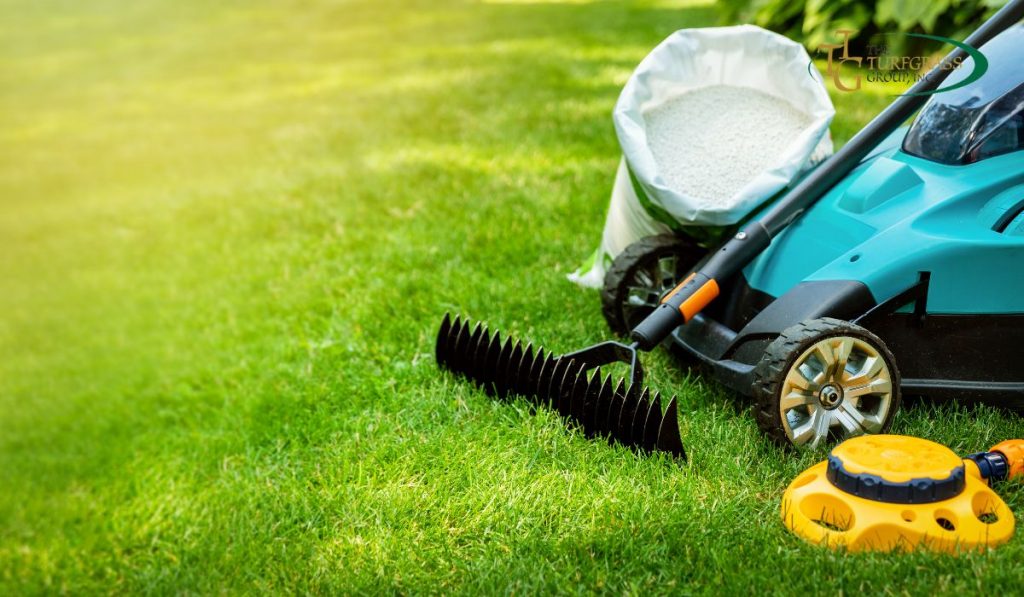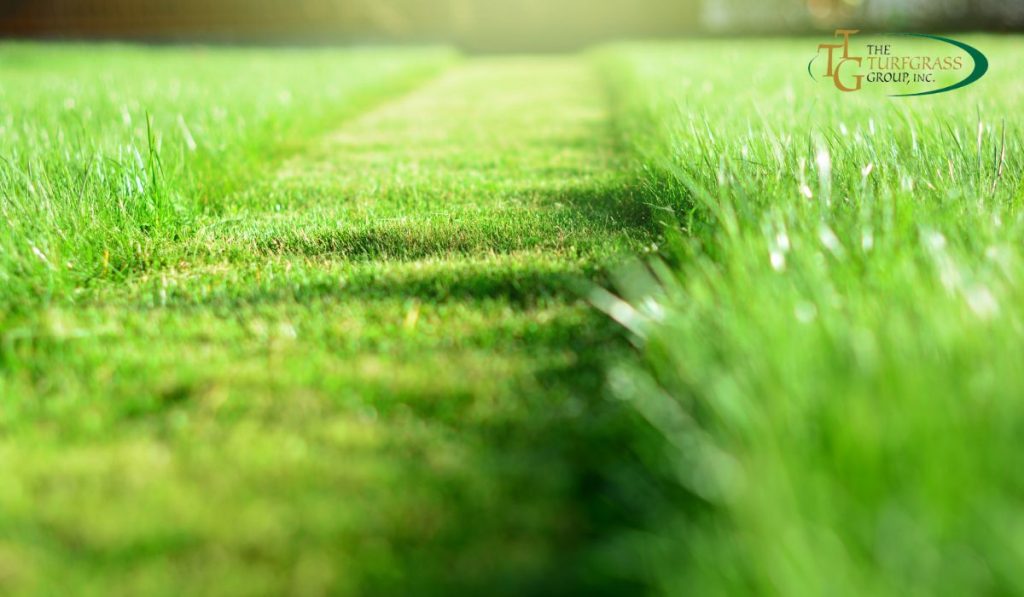
Bermuda grass is well-liked because it can withstand hot and dry climates.
Proper care and maintenance are crucial to keep your Bermuda grass healthy and vibrant.
Here are some tips to help you care for your yard and achieve a lush Bermuda grass lawn.
Understanding Bermuda Grass
Bermuda grass, scientifically known as Cynodon dactylon, is a warm-season grass commonly used for lawns due to its resilience and ability to withstand high temperatures.
Proper care and maintenance practices are crucial to ensure a healthy and vibrant Bermuda grass lawn.
Best Practices for Bermuda Grass Care
Watering
Proper watering is vital for Bermuda grass care.
Watering deeply and infrequently is recommended, allowing the soil to dry between watering sessions.
Aim for about 1 inch of water per week, including rainfall.
Watering in the early morning or late afternoon helps minimize evaporation and allows the grass to dry before evening.
Mowing
Regular mowing is essential for Bermuda grass to thrive.
Set your mower at around 1 to 1.5 inches for optimal results.
Avoid cutting over one-third of the grass blade’s length in a single mowing session, as it can stress the grass and hinder its growth.
Fertilizing
Fertilization plays a crucial role in Bermuda grass care.
Apply a balanced fertilizer with a high nitrogen content during the active growing season.
Start fertilizing in late spring or early summer, and continue every 4 – 6 weeks until early fall.
Follow the manufacturer’s instructions for proper application rates.

Weed Control
Weeds can quickly invade Bermuda grass lawns, competing for nutrients and space.
Regular weed control measures are necessary to maintain a healthy property.
Apply pre-emergent herbicides in early spring to prevent weed seeds from germinating.
For existing weeds, use post-emergent herbicides targeted specifically for Bermuda grass.
Managing Common Lawn Pests
Bermuda grass can be susceptible to various pests, such as armyworms, grubs, and chinch bugs.
Look for any signs of pest infestations, including yellowing patches or unusual grass behavior.
Consult with a local lawn care expert or use appropriate insecticides to address pest issues effectively.
Seasonal Bermuda Grass Care Guide
Spring Care
In spring, Bermuda grass starts to emerge from its dormant state.
Begin by removing any debris or dead grass using a rake.
Perform aeration to improve soil compaction and promote better nutrient absorption.
Apply a slow-release nitrogen fertilizer to encourage healthy growth.
Summer Care
During the hot summer months, Bermuda grass thrives.
Ensure proper watering to prevent drought stress.
If the lawn shows wear and tear, consider overseeding to fill in bare spots.
Spot treat weeds as they appear and monitor for pests regularly.
Fall Care
As temperatures start to cool in fall, Bermuda grass enters a period of dormancy.
Gradually reduce watering frequency and mowing height.
Rake up fallen leaves to avoid suffocating the grass.
A final application of winterizer fertilizer helps fortify the grass before winter sets in.
Winter Care
Bermuda grass goes dormant in winter, and its growth slows down significantly.
Keep the lawn free of debris and continue to monitor for pests.
Avoid walking on frozen grass, as it can cause damage.
Once spring arrives, resume regular care practices to revive the lawn.
Troubleshooting Common Bermuda Grass Issues
Various issues can arise when caring for Bermuda grass.
Here are a few common problems and their solutions:
Patchy or Thin Growth
Patchy or thin growth can occur due to inadequate sunlight, improper watering, or nutrient deficiencies.
Ensure proper lawn care practices, including sufficient sunlight, regular watering, and appropriate fertilization.
Brown or Yellow Spots
Brown or yellow spots indicate drought stress, disease, or pest damage.
Adjust watering schedules, check for signs of illness, and address any pest issues promptly.
Weed Infestation
Weed infestations can hinder Bermuda grass growth and appearance.
Implement proper weed control strategies, including pre-and post-emergent herbicides, to keep weeds at bay.
Expert Tips To Keep Your Bermuda Grass Healthy
- Regularly monitor soil moisture to avoid overwatering or underwatering.
- Perform proper mowing techniques, adhering to the recommended height.
- Adjust fertilization rates based on soil test results for optimal nutrient balance.
- Stay vigilant for signs of pests or diseases and take appropriate action.
- Provide adequate sunlight to promote healthy growth.
- Overseed bare spots during the active growing season for uniform coverage.
The Key Take-Away On Bermudagrass Lawn Care
Bermuda grass care requires a combination of proper watering, mowing, fertilizing, and weed control practices.
Understanding the unique needs of Bermuda grass throughout the seasons is crucial for maintaining a healthy and lush lawn.
Following the best practices outlined in this guide and promptly addressing common issues, you can enjoy a vibrant Bermuda grass lawn year-round.
Conclusion
Caring for Bermuda grass involves a commitment to regular maintenance and addressing specific needs at different times of the year.
By adopting the recommended care practices, you can create an inviting and visually appealing lawn that enhances the overall beauty of your outdoor space.
Remember, a well-cared-for Bermuda grass lawn is a testament to your dedication and love for a lush green environment.
FAQs
How do you take care of Bermuda grass?
To care for Bermuda grass, ensure proper watering, regular mowing, fertilization during the growing season, weed control, and monitoring for pests and diseases.
Follow the guidelines provided in this comprehensive care guide to maintain a healthy Bermuda grass lawn.
What month should I fertilize Bermuda grass?
Fertilize Bermuda grass during the active growing season, typically from late spring to early fall.
Begin fertilization in late spring or early summer and continue every 4 to 6 weeks, following the recommended rates on the fertilizer packaging.

What are the drawbacks of Bermuda grass?
Bermuda grass can be invasive and spreads aggressively, which may require containment efforts.
It can also turn brown when exposed to cold temperatures or prolonged drought conditions.
Additionally, Bermuda grass may require more frequent mowing than other grass types.
How do you winterize Bermuda grass?
To winterize Bermuda grass:
- Reduce watering frequency gradually as temperatures cool.
- Apply a fall-prepared fertilizer to fortify the grass before winter dormancy.
- Clear the lawn of debris and avoid walking on frozen grass to prevent damage.
What is the best thing to put on Bermuda grass?
Use a balanced fertilizer with a high nitrogen content for optimal Bermuda grass care.
Apply a slow-release nitrogen fertilizer during the active growing season to promote healthy growth and maintain a vibrant green color.
Why does Bermuda grass turn brown after mowing?
Bermuda grass may turn brown after mowing due to stress caused by removing a significant portion of the leaf blades.
This stress response is temporary; with proper care, the grass will recover and regain its green color.
How many times a year should I fertilize my Bermuda grass?
Fertilize Bermuda grass every 4 to 6 weeks during the active growing season.
Follow the manufacturer’s instructions on the fertilizer packaging regarding application rates for your specific lawn size.
Should I water Bermuda before or after mowing?
It’s best to water Bermuda grass before mowing.
Wet grass can clump together, making it difficult to achieve an even cut.
Watering before mowing allows the grass to dry slightly, making the mowing process more efficient.
What time of day should I water Bermuda grass?
Water Bermuda grass early in the morning or late afternoon.
These times allow the grass to absorb the moisture before the day’s heat evaporates.
Watering in the evening or at night can promote fungal growth due to prolonged dew on the grass.
Will Bermuda grass take over my lawn?
Bermuda grass has a strong growth habit and can spread aggressively, particularly in warm climates.
To prevent it from taking over other areas, consider using physical barriers, such as edging or regular maintenance, to contain its growth.
Is too much water bad for Bermuda grass?
Yes, excessive watering can be detrimental to Bermuda grass.
Overwatering can lead to shallow root growth, increased susceptibility to disease, and weaker grass overall.
Follow proper watering practices to ensure healthy growth.
Why would anyone want Bermuda grass?
Bermuda grass is a popular lawn choice due to its ability to withstand hot temperatures, excellent recovery from wear and tear, and overall resilience.
It forms a dense, vibrant green turf that adds aesthetic appeal to outdoor spaces.
What temperature kills Bermuda grass?
Bermuda grass can tolerate a wide range of temperatures but becomes dormant and turns brown when exposed to temperature below 55°F (12°C).
However, it typically recovers and regains its green color once temperatures warm up.
When should you stop cutting Bermuda grass?
In late fall, as temperatures cool and Bermuda grass enters dormancy, gradually raise the mowing height.
Once the grass has fully transitioned into dormancy, you can stop cutting it until the following spring.
Should I cut Bermuda for winter?
During winter, when Bermuda grass is dormant, it’s not necessary to mow it.
Instead, focus on maintaining a clean lawn free of debris and continue monitoring for any signs of pests or diseases.
What does Epsom salt do for Bermuda grass?
Epsom salt contains magnesium and sulfate, which can benefit Bermuda grass.
Applying Epsom salt to the grass can help improve nutrient uptake and enhance overall grass health.
However, using it sparingly and following recommended application rates is essential.
Do coffee grounds help Bermuda grass?
Coffee grounds can use as a natural fertilizer for Bermuda grass.
They add organic matter to the soil and provide trace amounts of nitrogen, potassium, and phosphorus.
Spread coffee grounds sparingly over the grass and water them thoroughly.
Why do you put sand on Bermuda grass?
Sand can be used on Bermuda grass to improve soil drainage and reduce compaction.
It helps create a looser soil structure, allowing roots to penetrate quickly and promoting healthier grass growth.
However, excessive sand application should be avoided, as it may hinder water retention.